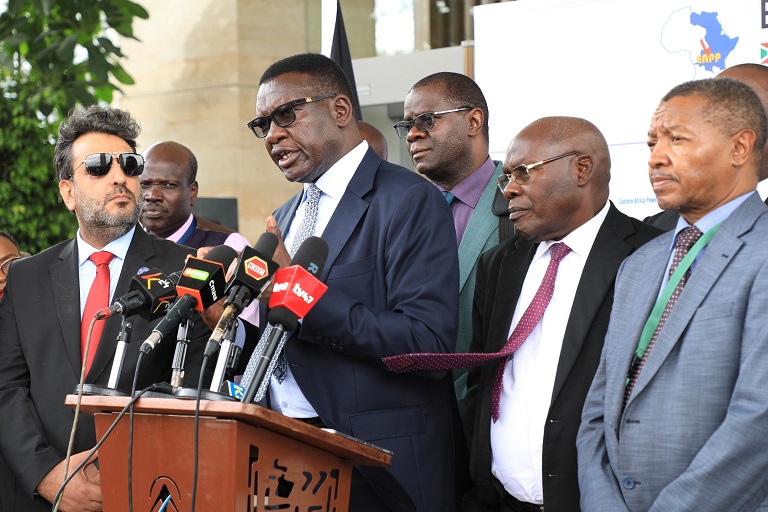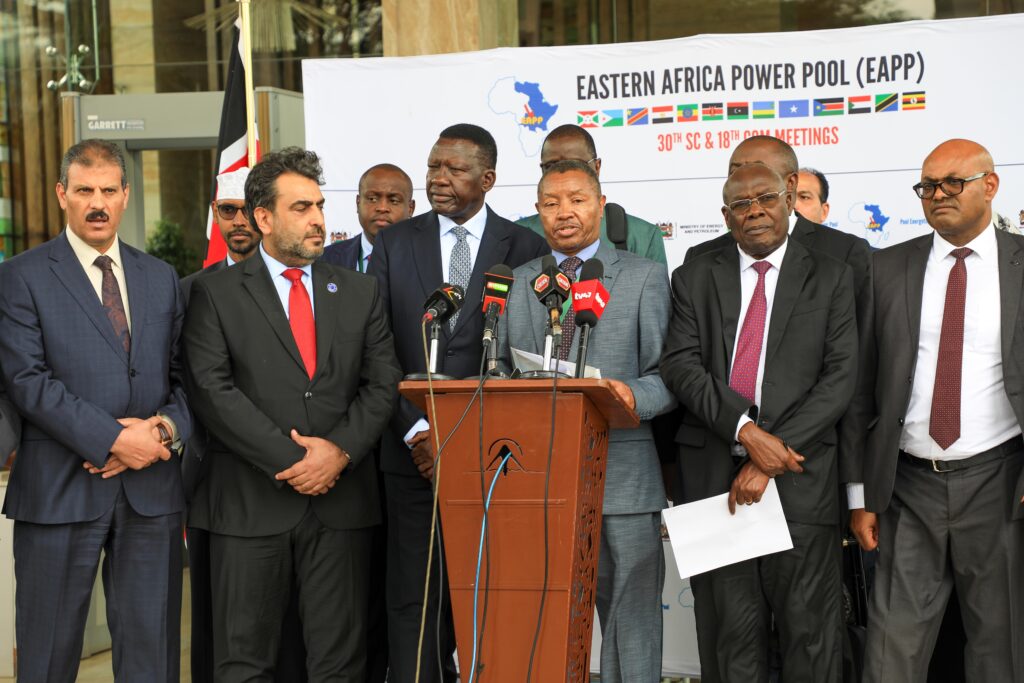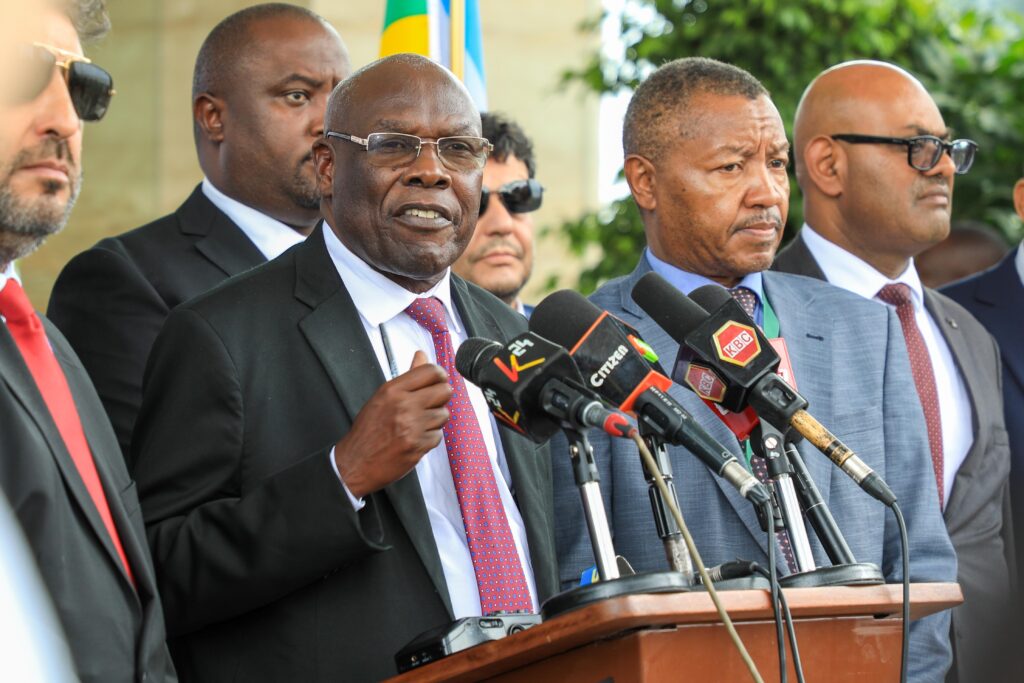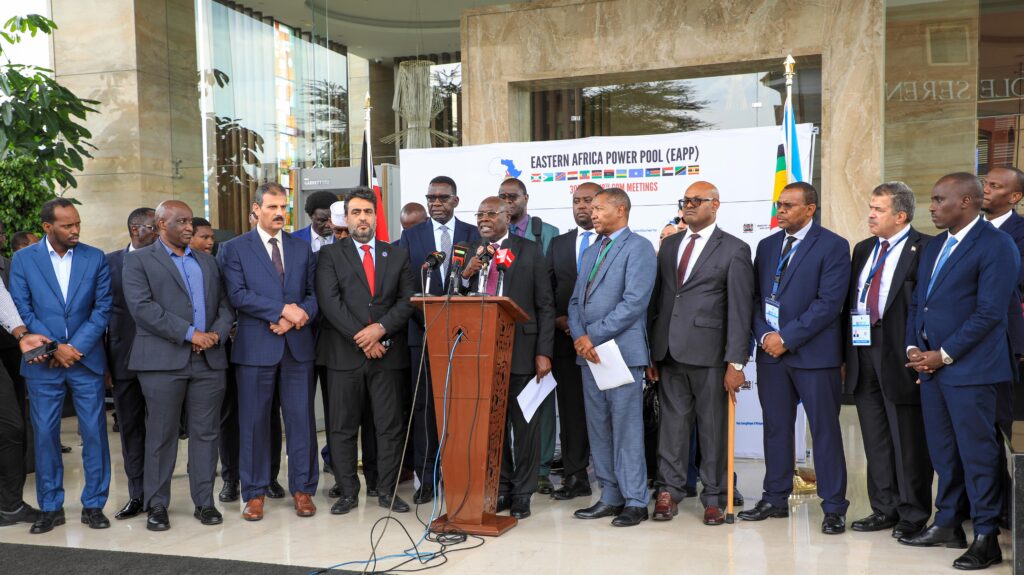Why A Robust Energy Revolution Is Needed In Eastern Africa- Chirchir

Cabinet Secretary Ministry of Energy and Petroluem Davis Chirchir addressing media during EAPP meeting. PHOTO/ EAPP
NAIROBI, Kenya – The Secretary General of the Eastern Africa Power Pool (EAPP), Eng James K. Wahogo, issues the following statement following the EAPP Steering Committee and Council of Ministers’ Meetings at Ole Sereni Hotel, Nairobi.
I am pleased to announce significant progress in our collective efforts toward fostering regional collaboration and advancing sustainable energy solutions and power trade across Eastern Africa.
The Eastern Africa Power Pool remains committed to enhancing energy security, promoting cross-border electricity trade, and driving the development of renewable energy sources within our member countries.
EAPP continues to facilitate the implementation of cross-border transmission projects aimed at strengthening regional connectivity and ensuring the reliable supply of electricity to our growing population. Together, we have the potential to impact over 600 million people through increasing of electrification rates within the region.
Currently the countries are trading over 3,400GWh annually, which represents a big achievement compared to the 504 GWh of power transferred in the region when the EAPP was first established in 2005. Ongoing efforts to enhance the interconnection of national power grids are progressing well, contributing to increased efficiency in power exchange and supporting economic development across member countries.
To build on the benefits of this interconnectivity, we are striving to have the competitive day-ahead power market go live by the end of December 2024. This market will take us from bilateral trade to trade amongst countries all countries in the region, ensuring not only regular supply but efficient use of energy.
Finally, we are actively promoting the harnessing of renewable energy sources to meet the region’s power demands sustainably. We are sourcing partnerships and financing for projects in solar and hydropower for a greener and more cost-effective energy future.
All this is made possible by the Steering Committee and Council of Ministers, whose recommendations form the guiding principles within which the Secretariat operates to fulfil its mandate. We are pleased with what has transpired here and extend our gratitude to the ministers, CEOs, senior officials, and delegates who endeavored to participate in these meetings.

Eng. James Wanjohi Secretary General Eastern Africa Power Pool (EAPP) addressing media. PHOTO/ EAPP
On his part, Cabinet Secretary, Ministry of Energy and Petroleum, Mr. Davis Chirchir noted the following:
1.That it has been an honor to host the EAPP Steering Committee and Council of Ministers Meetings in Nairobi. We had representations from member states along with key development partners like the World Bank, the African Development Bank (AfDB), USAID/Power Africa.
2. The representatives from the member countries and utilities in the Eastern Africa region actively participated in these meetings, reflecting a shared commitment to advancing regional cooperation in the energy sector.
3. Together, these countries have an installed capacity of 90.6GW against a peak demand of 59.4MW which is estimated to grow at a rate of 6% annually. In total, the cross-border trade in terms of electricity sales within the EAPP member countries was about 2,527GHh between quarter 1 and quarter 3 of 2024.
4. The discussions held were key in strengthening the organizational structure of the EAPP with a view of enhancing coordination, streamlining decision-making processes and to fortify the EAPP’s capacity to address emerging challenges head-on.
5. Africa is now experiencing a new frontier of industrialisation and economic growth, and this calls for a robust energy revolution to match the current and future demand. However, almost 600 million of the 1.5 billion people in Africa do not have access to electricity, with a bigger number being served by unclean sources.
6. This scenario calls for regional partnerships to address the dynamic energy landscape in Africa for the good of our citizens. This week’s deliberations therefore mark a substantial step towards enhancing energy security, promoting renewable resources, and driving economic development across our diverse nations.
7. Going forward: One of the highlights of the discussions focused on collaborative initiatives aimed at strengthening the Eastern Africa Power Pool’s capacity and resilience. Over the next few weeks as a follow-up to this week’s meetings, we will be looking to approve some proposed policies, plans, and budgets which we believe will help scale up the interconnectivity of the Eastern Africa grid going forward.

Hon. Sidronius Okaasai Opolot, Chairperson Council of Ministers(EAPP) and Minister of State for Energy Uganda addressing media. PHOTO/ EAPP
8. With the support of our development partner, the World Bank, we are poised to formulate draft rules and develop a trading platform to actualise the Day Ahead Market by year-end. This endeavour aims to foster trade, competition, and broader participation in the regional power market.
9. Kenya has already reaped the rewards of regional integration through bilateral frameworks, such as importing 200MW of renewable energy from Ethiopia and engaging in energy exchange with Uganda. These initiatives have ensured a reliable energy supply and reduced outage risks. Additionally, plans are at advanced stages to complete, commission, and operationalise the Kenya – Tanzania inter-connector. Other key exciting projects include the Egypt – Libya line, Egypt – Sudan, Ethiopia – Sudan, Ethiopia – Djibouti, and the Uganda – Rwanda lines.
10. Finally, we also discussed the issue of admitting Independent Power Producers and Independent Transmission Developers to be part of the East African Power Pool. Noting that such private players hold a considerable energy market share in the region, we cannot afford to leave them behind in the regional power integration program. The discussions around this will continue and we will be providing updates in the months ahead.
11. I extend my gratitude to all participating nations, delegates, and stakeholders for their invaluable contributions. The success of these meetings underscores our shared vision of creating a sustainable and integrated energy framework for the Eastern African region.
12. As members of the Eastern Africa Power Pool, we have a unique opportunity to shape the destiny of our region for generations to come.

The Eastern Africa Power Pool Steering Committee and Council of Ministers’ Meetings members addressing the press at Ole Sereni Hotel in Nairobi. PHOTO/ EAPP
Overview:
The Eastern Africa Power Pool (EAPP) is a regional organization established to facilitate the development, and integration of power infrastructure across Eastern Africa. Formed by member countries in 2005, EAPP aims to enhance energy security, promote sustainable development, and foster collaboration and trade in the power sector.
Member Countries:
Burundi, Democratic Republic of Congo, Djibouti, Egypt, Ethiopia, Kenya, Libya, Rwanda, Somalia, South Sudan, Sudan, Tanzania, and Uganda.
Objectives:
▪ Regional Integration: Foster cross-border electricity trade and cooperation in the planning, operation, and development of power infrastructure.
▪ Energy Security: Enhance the reliability and security of the electricity supply system through regional collaboration and resource sharing.
▪ Renewable Energy Development: Promote the utilization of renewable energy sources for sustainable power generation.
▪ Capacity Building: Facilitate knowledge exchange, capacity building, and skill development in the power sector across the region.
Key Achievements:
▪ Cross-border transmission projects and facilitation of financing to enhance regional connectivity. For instance, the Ethiopia-Kenya, Uganda-Rwanda, Kenya-Tanzania interconnections.
▪ Successful implementation of joint power projects, contributing to increased energy access.
Current Projects:
▪ Power system interconnection projects: Ongoing projects to strengthen the interconnection of national grids, promoting increased efficient power exchange.
▪ Development of Power Market: After running a successful Shadow Market where member countries simulated how the real power market would run, EAPP is now working to set up the interface for the day-ahead and intra-day market to be launched in 2025.







